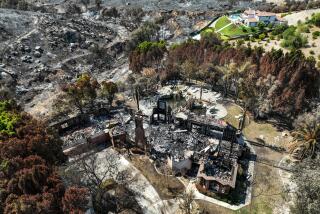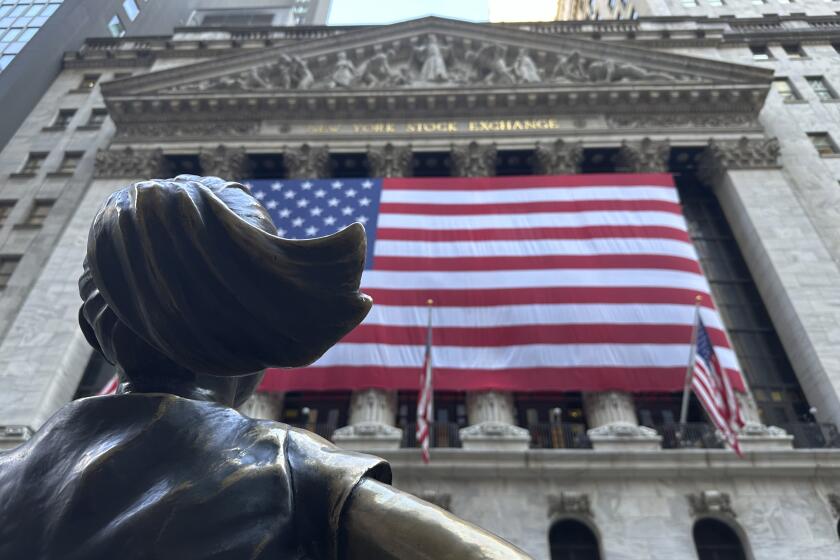Subway Founder DeLuca Is a Hero’s Hero : Dining: He opened his first sandwich store in 1965 at age 17. Today the company ranks as one of the top franchise firms.
Fred DeLuca looks like a wide-eyed boy as he describes his favorite sandwich.
“Tuna on whole wheat with the works--with lots of hot peppers. Pour on the jalapenos, “ he says, motioning as if if he were pouring the hot peppers from a bucket.
Not exactly a gourmet’s delight, but DeLuca’s not talking fine cuisine. He’s talking subs.
DeLuca knows subs. He’s co-founder and president of Subway Sandwiches, a chain that’s opening stores so fast it now has more U.S. outlets than fast-food giants Burger King and Kentucky Fried Chicken.
Subway, ranked by Entrepreneur magazine as the top franchise company in the world for five out of the last six years, has opened an average of 1,000 stores a year since 1987.
Subway had 7,750 stores in 14 countries, at last count.
It’s now the country’s leading non-burger sandwich chain, ranked in both sales and number of outlets, holding an estimated 20% share of the market.
Sales, which were $1.7 billion in 1992, are expected to climb to $2.2 billion this year.
DeLuca won’t discuss profits at the company, which doesn’t report them because it is privately owned. But, he says, “You can’t count that high.”
That’s a long way from Subway’s start as a teen-ager’s plan to make money for college.
DeLuca opened the first Subway in 1965 when he was 17.
Backed by a partner and a check for $1,000, he rented a small store in downtown Bridgeport, Conn., for $165 a month. He built a small take-out counter and started selling what he called “subs,” those tunnel-shaped sandwiches also known as heroes, grinders, poor-boys or hoagies, depending on what part of the country you’re from.
DeLuca hoped his venture would help him earn enough money to pay his tuition at the University of Bridgeport, where he was majoring in psychology. Somewhere along the way, DeLuca hit the American dream.
“Actually, it was pretty much by accident,” says DeLuca, who dresses in expensive designer suits, but takes his shoes off as soon as he gets to work.
“I don’t think I ever dreamt of going into business,” he said. “No one in my family was in business.”
He traces his business sense to age 10, when his family moved from the Bronx to Schenectady, N.Y., where DeLuca delivered newspapers. He expanded his customer base from 50 to 95.
“I remember the apartment complex we lived in had 108 apartments,” he said. “I started delivering and I said, ‘You know, I walk by all these places every day, so I might as well have them all as customers.”’
In Schenectady, DeLuca met Peter Buck, a newspaper customer and family friend. Buck and DeLuca would sometimes eat at a place called Mike’s Submarine Sandwiches, a local chain that sold foot-long Italian sandwiches.
A few years later, DeLuca approached Buck at a family picnic and asked him for ideas on how he could make money for college.
Buck, then 34, a nuclear engineer working at General Electric Co., suggested he open a submarine sandwich shop like Mike’s.
That day, they became partners. Their goal: 32 stores within 10 years.
The first Subway store got off to a flying start. So many people showed up on opening day DeLuca had to hire people waiting in line for subs to help him make the food. The store sold out its provisions within hours.
But in six months, the store was losing money. Instead of closing, DeLuca and his partner opened a second store to create the illusion of success. Within a year, there were three stores and business started to pick up.
By 1973, there were 16 stores, but DeLuca and Buck were far short of their original goal of 32 stores. So they decided to franchise, or license the Subway name to others.
That decision proved to be a boon for Subway. From 1974 to 1978, the Subway chain grew from 17 stores to 100. By 1982, there were 200. At that point, DeLuca set a goal of 5,000 stores by 1994. He hit that mark in 1990.
DeLuca and Buck still are partners, but Buck is semi-retired.
DeLuca’s friends aren’t surprised by his success, but they are surprised that submarine sandwiches put him there.
Jack Eng, a friend since high school, remembers DeLuca talking about using the money from the first Subway store to attend medical school.
“He was always driven, but he told me he wasn’t interested in business,” Eng said. “I remember asking him why don’t you change majors since you are working at the stores, but I think he just saw the chain as a means to an end, and the end was to become a doctor.”
At 45, DeLuca has trim, boyish looks and a soft-spoken manner that seems out of place in the often-frenetic corporate world.
He still parties with his college fraternity brothers. His favorite pastime is movies.
DeLuca splits his time between his house in Orange, Conn., and a house in Ft. Lauderdale, Fla. Wife Liz, his high school sweetheart, has worked at Subway world headquarters in Milford, Conn., for the last 13 years. His son John, 20, a college student, is working there this summer. The family is worth millions of dollars but DeLuca won’t disclose his income.
Subway’s corporate headquarters are set in an office park surrounded by woods and ponds, a location DeLuca says he picked because he didn’t want his employees to have “that rat-race mentality.”
Downstairs in a company cafeteria, DeLuca offers his 400 employees free breakfast and lunch. The cafeteria is set up much like a Subway shop--complete with the standard Subway menu and Subway’s yellow booths.
Once a month, DeLuca rents a local movie theater and invites the entire staff and their guests to watch sneak previews of the latest releases. Occasionally, DeLuca throws the staff a party at a local pub, usually to mark some company milestone, but sometimes “just because,” he says.
DeLuca’s mellow corporate philosophy seems to extend to his employees. Many have posters plastered across their work cubicles and some have boom boxes in their offices, where they are free to listen to “whatever type of music they want as they work,” DeLuca says.
Fast-food industry analysts say Subway’s success can be traced to Deluca’s aggressive marketing and the relatively low start-up fees for a franchise.
Subway franchisees typically make an initial investment of about $80,000--$10,000 for the franchise, $30,000 for equipment, $30,000 for remodeling and $10,000 for miscellaneous expenses.
“I think he’s got the right product at the right time, and the ability to promote it very well,” said Edward Kushell, a Los Angeles franchising consultant.
Subway’s rapid growth has not been without problems. Some Subway franchisees have complained that DeLuca has glutted certain markets and made it difficult for them to make healthy profits or even to stay in business.
DeLuca says the average Subway franchisee makes a profit of between $40,000 and $50,000 a year. He says only about 1% of the stores fail.
In DeLuca’s view, an important underlying element in the success rate is the simplicity of the Subway menu, with just a dozen basic sandwiches.
“It’s a loaf of bread, with meat and vegetables,” he says.
More to Read
Inside the business of entertainment
The Wide Shot brings you news, analysis and insights on everything from streaming wars to production — and what it all means for the future.
You may occasionally receive promotional content from the Los Angeles Times.






